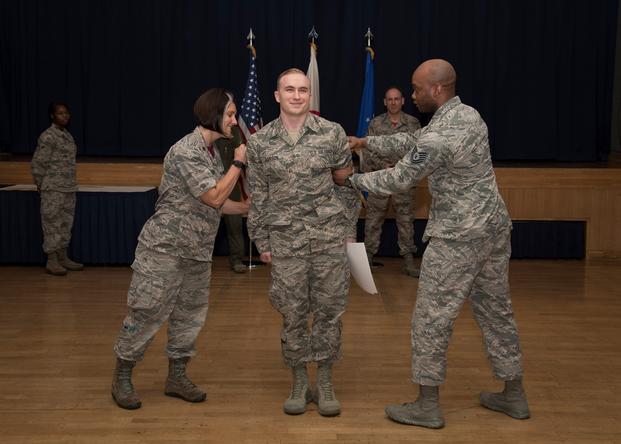ORLANDO -- The Air Force is determining how best to move forward with the Defense Department's new hazing and misconduct policy, aiming to follow guidelines while still keeping some traditions associated with the practice of "tacking-on" rank or insignia during promotion ceremonies, the top enlisted leader of the Air Force said Thursday.
The policy, released earlier this month, includes a definition of hazing that explicitly encompasses "pinning" or "tacking-on" during promotions.
"We want to be able to provide our senior leaders out in the field the right guidance on what they should do in lieu of these promotion ceremonies, which we have every month," said Chief Master Sergeant of the Air Force Kaleth O. Wright. Wright sat down with Military.com during the Air Force Association's Air Warfare Symposium here.
Wright said he knows there will be pushback from airmen on "the cultural birthright" to pin on new stripes, and while the Air Force-specific policy is still being crafted, the message is "clear cut."
Related content:
-
Pentagon Unveils Policy to Combat Misconduct, Harassment in the Ranks
-
Nellis NCO Under Investigation after Profane Rant Against Subordinates
"We need to make sure that we really understand the department's intent exactly," he said. But "I don't think [the Air Force] will straddle the middle" between the guidance and the pin-on practice.
While the term "pinning" or "tacking-on" may evoke the infamous tradition of pounding new rank into an airman's chest hard enough to break the skin, the term also encompasses less extreme physical actions, such as an "atta-boy" nudge or other physical gestures of congratulation. In unofficial capacities, however, more dramatic hazing and abusive behavior may still persist.
"We'll be in line with the DoD policy, again, we just have to figure out what it means, and exactly what we want to articulate to commanders in the field," Wright said.
He said the guidance language is there for a reason.
"I hate to say and believe tacking and pinning ceremonies that we do in the Air Force were collateral damage, but this was probably aimed at some of the tacking and pinning and hazing that's done, not just in a formal promotion ceremony in front of a crowd of people, but ... in Special Operations or some other career field, some other specialty where you've achieved something significant and go through some ritual to culminate that process," Wright said.
Tolerance of hazing has never been the Air Force's message, he said. Leaders have tried to tackle various ceremonial issues that, for one reason or another, have gotten out of hand.
"I've worked for commanders who've decided, 'Hey this is too much, so let's stop doing that,' " Wright said, without specifying any incidents.
Whatever comes next for airmen, he said it's always been about achieving a milestone in their careers.
"Airmen get excited for a day or two, then they move on, and realize that, 'Man, I'm just thankful to get promoted, my family was able to be there, so if I don't get the biggest guy in the world to knock me off the stage, then no problem,' " he said.
The Pentagon on Feb. 8 put forth a new policy -- DoD Instruction 1020.03 Harassment Prevention And Response in the Armed Forces -- aimed to deter misconduct and harassment among service members. The policy reaffirmed the Defense Department does not tolerate any kind of harassment by any service member, either in person or online.
The guidance went into effect immediately, outlining the department's definitions of what is considered harassment. However, each service -- Army, Air Force, Navy, Marine Corps -- is in charge of planning its implementation, outlining steps and milestones in order to comply with the instruction, which supersedes any past anti-harassment policies.
Among activities that specifically define hazing are oral or written berating for the purposes of humiliation, "any form of initiation or congratulatory act" that includes striking or threatening to strike someone; encouraging someone to engage in "illegal, harmful, demeaning, or dangerous" activities; breaking the skin, as with rank insignia or badges in "pinning" rituals; branding, tattooing, shaving or painting someone; and forcing someone to consume food, water, or any other substance.
"Service members may be responsible for an act of hazing even if there was actual or implied consent from the victim and regardless of the grade or rank, status, or service of the victim" in either official or unofficial functions or settings, the policy continues.
Upon the policy's debut, some airmen and Air Force veterans took to the popular Facebook group Air Force Amn/nco/snco to criticize the policy's ban on the "tacking-on" tradition.
"It's an honor to be tacked on!" wrote one former airman.
"This is why we should halt all Wing level promotion ceremonies and give the role back to the squadron to address promotions how they see fit for morale and unit bonding," wrote another.
Others questioned what other policies will erode practices over time. "What little heritage and traditions we had ... they're gone now ... no wonder the morale is at an all time low," wrote a retired airman.
Wright did not specify when the Air Force plans to present its own guidelines.
"We will have to convene, next time I sit down with the boss [Chief of Staff Gen. David Goldfein] ... [to determine] where we want to go," he said Thursday.
Additionally, the Pentagon will receive a first-of-its kind report on hazing in the ranks, tracking data and victim reports in order to better standardize reporting information and case collection. Services need to meet that report deadline by Dec. 1.
-- Oriana Pawlyk can be reached at oriana.pawlyk@military.com. Follow her on Twitter at @oriana0214.




























